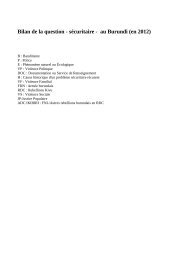You also want an ePaper? Increase the reach of your titles
YUMPU automatically turns print PDFs into web optimized ePapers that Google loves.
COLE BUNZEL<br />
ISLAMIC STATE IDEOLOGY AND SAUDI ARABIA<br />
While the Islamic State’s ideology is informed by a variety of influences,<br />
the most prominent and significant is that of Wahhabism, the historically<br />
severe form of Sunni Islam indigenous to Saudi Arabia. Founded by<br />
a preacher named Muhammad ibn Abdul Wahhab, it emerged in central<br />
Arabia during the mid-eighteenth century. Ibn Abdul Wahhab and the Al-<br />
Saud family formed a state that eventually went on to conquer most of the<br />
Arabian Peninsula.<br />
Wahhabism, as its enemies have long called it, is a purist movement<br />
that emphasized the “proper” worship of God. While Wahhabis generally<br />
do not use the term Wahhabi to describe themselves, preferring “Salafi” or<br />
“Muslim,” they do recognize that their movement is distinct. They describe<br />
it with such terms as “the mission of the Sheikh Muhammad ibn Abdul<br />
Wahhab” and “the Nejdi mission.”<br />
Historically, the Wahhabi movement, however one calls it, was exclusionary<br />
and aggressive: all Muslims professing a different version of Islam<br />
were considered unbelievers who deserved to be shunned, hated, and<br />
fought. Wahhabism was seen by the majority of the Islamic world of the<br />
eighteenth century as a terrible heresy, in much the same way as the Islamic<br />
State is seen by the Islamic world today.<br />
The official religious establishment in Saudi Arabia espouses a much<br />
softer form of Wahhabism than before and refuses to acknowledge the<br />
Islamic State’s appeals to the more radical Wahhabi heritage. The kingdom’s<br />
scholars strongly repudiate the group, declaring its members to be<br />
“Kharijites,” a reference to an early radical Muslim sect that excommunicated<br />
and fought fellow Muslims. Yet since the Kharijites were, according<br />
to many Wahhabi scholars, still Muslims, the accusation of Kharijism<br />
does not rise to the level of excommunication. Only a few Saudi religious<br />
scholars have declared the group to be apostates. The Saudi scholars have<br />
further distanced the kingdom’s own interpretation of Islam from that of<br />
the Islamic State by arguing a foreign agenda motivates the actions of the<br />
latter group. The scholars emphasize the purported influence of Muslim<br />
Brotherhood ideology, for example, or allude to some supposed Israeli support.<br />
In general, the scholars, along with the government, have sought to<br />
downplay the link between the kingdom’s Wahhabi history and the Islamic<br />
State’s current ideology.<br />
38






